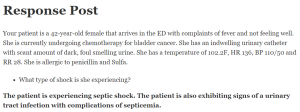Response Post

Your patient is a 42-year-old female that arrives in the ED with complaints of fever and not feeling well. She is currently undergoing chemotherapy for bladder cancer. She has an indwelling urinary catheter with scant amount of dark, foul smelling urine. She has a temperature of 102.2F, HR 136, BP 110/50 and RR 28. She is allergic to penicillin and Sulfa.
- What type of shock is she experiencing?
The patient is experiencing septic shock. The patient is also exhibiting signs of a urinary tract infection with complications of septicemia.
- What interventions do you anticipate the doctor will order?
I would anticipate for the MD to conduct a urine culture, fluid maintenance, IV antibiotics, and a CBC because the patient is on chemotherapy. The MD might also order a vasopressor which constricts the blood vessels and increases the blood pressure to keep the organs from shutting down.
- What can you teach this patient about prevention of infection?
I would teach the patient the importance of maintaining proper hygiene while handling the catheter, regular changing of the catheter, wipe front to back after using the restroom, urinate immediately after intercourse, wear cotton underwear, and consuming plenty of water to maintain a healthy urinary tract
- The doctor orders Bactrim. What should you be concern about? Why?
The patient is allergic to Sulpha and the doctor has prescribed Bactrim which is a combination drug that consist of Sulpha. I would be concerned because the patient is allergic to the prescribed medication but also needs immediate antibiotic therapy.
2.)
- What type of shock is she experiencing?
Distributive shock (Septic Shock)
- What interventions do you anticipate the doctor will order?
-Infection control: All invasive procedures must be carried out with aseptic technique after careful hand hygiene
-Collaboration: The nurse must collaborate with the other members of the healthcare team to identify the site and source of sepsis and specific organisms involved.
-Management of fever: The nurse must monitor the patient closely for shivering
-Pharmacologic therapy: The nurse should administer prescribed IV fluids and medications including antibiotic agents and vasoactive medications
-Monitor blood levels: The nurse must monitor antibiotic toxicity, BUN, creatinine, WBC, hemoglobin, hematocrit, platelet levels, and coagulation studies.
-Assess physiologic status: The nurse should assess the patients hemodynamic status, fluid intake and output, and nutritional status
- What can you teach this patient about prevention of infection?
-Prevent shock episodes: The nurse should instruct the patient and the family strategies to prevent shock episodes through identifying the factors implicated in the initial episodes.
-Instructions on assessment: The patient and the family should be taught about assessments needed to identify the complications that may occur after discharge.
-Treatment modalities: The nurse must teach the patient and the family about treatment modalities such as emergency administration of medications, IV therapy, parenteral or enteral nutrition, skin care, exercise, and ambulation.
- The doctor orders Bactrim. What should you be concern about? Why?
Bactrim belongs to a drug class called sulfonamides. I would be concerned because the patient has an allergy to this drug class.